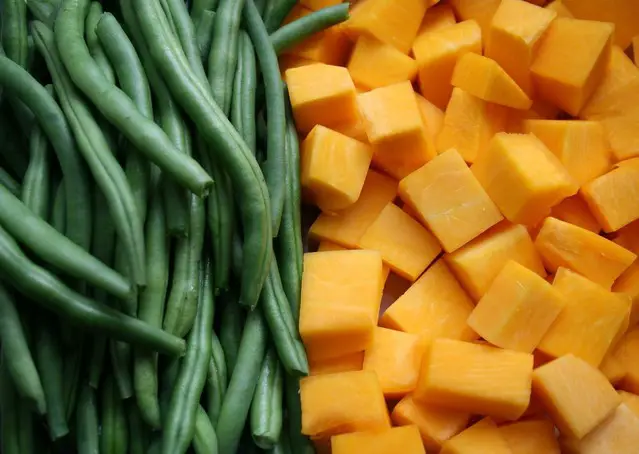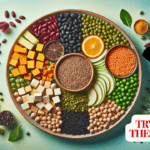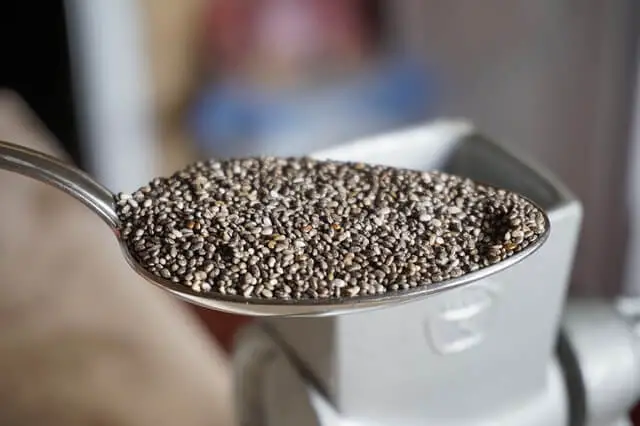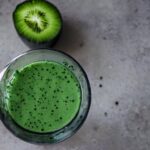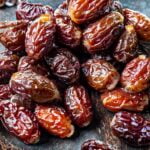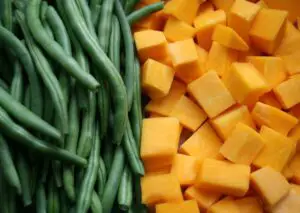
Our family has been doing the Whole Food Plant-Based Diet for years now, and without knowing it, we were eating the WFPBNO diet for some time as well without knowing it. I even experienced some automatic weight loss on WFPBNO without even trying.
Since then I’ve made some slight modifications to the WFPBNO diet based on the plant-based knowledge I’ve gained. I’ll break down everything about the WFPBNO diet below, including what the meaning or definition is, my experience and weight loss with it, why I think it might be too broad of a diet, and what modifications can be made as a WFPBNO eater.
What is WFPBNO?
Although I was familiar with the term WFPB, (Whole Food Plant-Based), I had never heard of WFPBNO until seeing it as an internet search term. Upon investigating, I found out the meaning is just the Whole Food Plant-Based Diet without any oils (Whole Food Plant Based No Oils).
That got me thinking, as I have some mixed feelings on oils, and it can really depend on the type of oil and also the context of what the person is looking to achieve with their WFPB diet. So here is my best advice for the WFPBNO diet and when it should be used and when it doesn’t have to be.
What does WFPBNO stand for?
WFPBNO stands for Whole Food Plant Based No Oil. The meaning of WFPBNO will be explained below if you are new to whole food plant-based eating.
WFPB vs. WFPBNO
The WFPB or Whole Food Plant-Based diet is a way of eating popularized by Dr. Colin Campbell who did the Forks Over Knives series. It looked at the largest amount of research and data and found that the healthiest way to eat was to minimize or eliminate animal-based foods such as meat and dairy, and instead eat more plant-based foods.
The trick is to also eat plant-based foods in their whole forms. So that means minimal or no processing, and to avoid foods where the plant-based foods have been broken down into separate parts from their original whole intact state.
So WFPNO expands on that idea of whole plant-based foods and also eliminates oils from the diet as well. In some aspects, it can be a very good thing and I’ll explain why. But as I’ll also look at, it can be a little too general depending on the goals and also the type of oil.
So in some circumstances, it might not be necessary and might make it more difficult for someone to follow the WFPB diet. Also, some oils can have positive nutritional value. I’ll also share my own experience of how I cut out most oils but then started adding some healthy ones back in and why I did.
What are oils?
Oils are foods that are pure fats and are liquid at room temperature. Fats have the most calories of the macronutrients by more than double. Nine calories per gram compared with 4 per gram for protein and 4 per gram for carbs. So oils generally are the highest in calories of most food options. Oils can also provide some essential nutrients. See What are oils for more.
Good Oils vs. Bad Oils
Just like the two witches in the Wizard of Oz, we can have both good oils and bad oils. I think it’s important to make the distinction. I believe bad oils are the highly processed and unnatural oils that are usually surprisingly from vegetable sources but created in unnatural ways. These oils are consumed in large quantities by Americans and are the ones such as canola oil, corn oil, and vegetable oil.
The vegetables they come from are not naturally oily, so the process to extract the oils is very unnatural and requires a lot of chemicals and unnatural processes. These oils are usually high in polyunsaturated fats (PUFAs) and Omega 6s, which Americans tend to get too high of a ratio of compared with Omega 3s.
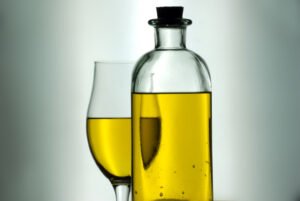
Another problem with these bad oils, is they tend to have a lower burning point and that means they are much easier to go rancid while cooking at higher temperatures. These rancid oils can have numerous health effects.
When consumed they can lead to oxidation in the body which can cause free radical production. These can damage cells, proteins, and DNA and increase the risk of certain diseases and cancer while speeding up aging and inflammation. So it’s best to completely avoid these oils whenever possible.
A lot of processed foods and junks foods contain these highly processed and rancid bad oils. That’s because they are the cheapest for food manufacturers to use. Just check the ingredients label of most of the stuff sitting on the shelves in your supermarket, and it probably has one of these less healthy oils in them.
Also, most fast food and fried foods are going to be made using these rancid unhealthy oils, so these foods are best to avoid. Another thing to consider is these oils have only been around for the last forty years or so as a modern invention, so we don’t even fully know their effect on long-term health. See Health Effects of Rancid Fat in Your Diet.
Are there any good healthy oils?
Yes, I think there are healthy oil options. But they are harder to find and you usually will have to cook with them and seek them out. These are more natural oils that have been around sometimes for millennia. Olive oil is a great example of a healthy oil that has been around for generations of people.
These oils are usually obtained by more natural processes and have higher cooking temperatures, so are less likely to go rancid. Generally, I’ve seen olive oil agreed upon by a lot of nutrition experts as the healthiest of all the oils to consume. It has a lot of healthy benefits to it such as
- High in antioxidants
- High in healthy monounsaturated fat
- Anti-inflammatory
- It May help prevent strokes
- Protective against heart disease
- May help against Alzheimer’s
- May help against Type 2 Diabetes
- May fight against cancer
- Help with arthritis
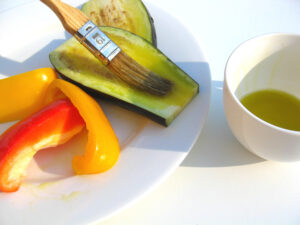
Also, the Blue Zones Project found the five healthiest groups of people worldwide. And one of these groups was the Ikaria, Greek people. This is where our Mediterranean Diet came from. These people were some of the healthiest in the world and they were eating moderate amounts of olive oil on a daily basis.
For all these reasons we choose to consume moderate amounts of olive oil. And that’s the key word, moderation. I believe the Ikarians were eating somewhere around 3 tablespoons a day, so this is about what I aim for.
Also, it’s best to get extra virgin olive oil as this means it has been less processed and will be better for you. I don’t think it’s as important to get organic olive oil, as what I’ve read said that olive oil tends to not use a lot of pesticides anyway, so there is little difference between the organic and non-organic varieties.
Another good oil to consider is avocado oil. This one is also high in monounsaturated fats and has many health benefits as well. Avocado oil also has a very high smoke point, so it’s very ideal for sautéing. This is what I use when cooking stuff on the stove since it does have a higher smoke point, just to be on the safe side. It is more expensive than olive oil and other oils though, which is the only drawback.
Including Some Good Oils in WFPBNO Diet
I think the main purpose of the WFPBNO diet as a modification from the WFPB diet, is to eliminate bad oils from our diet. A lot of people nowadays are eating way too many oils and especially bad oils. That’s because so much fast food is fried in grease and large amounts of oil. Also, processed foods all contain these oils added to them.
I’ve even heard that as Americans, the ratio of Omega 6s consumed compared to Omega 3s is drastically out of balance! This is due to so many of these unhealthier oils added to so many convenience foods and fried foods we eat.
I don’t think we have to completely throw the baby out with the bathwater. I think it is important to cut out or drastically reduce a lot of these extra oils and fried foods. But, I do think there are still some healthy oils like olive oil that can safely be added back into the WFPBNO diet.
Also, it might depend on your current goals. When I wasn’t eating very many oils, I lost weight on WFPBNO. When I started adding olive and avocado oil back into my WFPBNO eating and WOE (way of eating), I was able to gain some weight back and maintain my weight. I’ll discuss this more below.
Controversial Oils
Last, I’d like to mention two controversial oils, the first which has much controversy behind it is coconut oil. I used to use coconut oil a lot, and still use it occasionally. But there is a lot of controversy and mixed opinions about the health benefits of coconut oil, so there are a lot of unknowns. It’s high in saturated fats, but some claim that it’s a different kind of saturated fat, but others say it is just as bad as regular saturated fat.
Also, it does come from a plant, but at the same time, it is highly processed. I recommend doing your own research before deciding to use it or not. But since I find olive oil and avocado oil to be so good for you, I don’t usually have too much need for coconut oil, except in certain baking recipes. So I keep it to a minimum but still do use it at times.
The final oil to mention is Palm Oil. I’ve heard that it is both good and bad, depending on which study or source is being used. Harvard Health mentions that while it is better than trans fats and oils, it is still not as good as olive oil. An even bigger issue with using palm oil might be the hugely detrimental effect it is having on the environment.
Palm Oil is leading to a huge amount of deforestation, which had been a large grouping problem and environmental concern. While most of the deforestation comes from raising cattle for animal meat and products, about 20% is caused by the production of products such as palm oil. For these reasons, it might be best to steer clear of Palm Oil entirely whenever possible. This can become increasingly challenging as it is found in a wide number of products and foods nowadays.
Also, see where this cardiologist includes olive oil in their diet for heart health.
WFPBNO diet for weight loss
How I naturally lost weight

Can WFPBNO help with weight loss? Absolutely. In fact, I think it’s one of the most powerful things you could do for weight loss. When I went plant-based and then eventually mostly vegan, I lost 15 pounds automatically without even trying to lose weight.
And I have a small frame and was not overweight initially, so 15 pounds was a lot for me. This could be a much, much higher number for someone already overweight and trying to intentionally lose weight. I did do some intermittent fasting, but I was doing that before making the diet change as well, so that shouldn’t be a factor.
I actually ended up losing so much weight that I needed to add oils (healthy oils) into my diet in order to gain the weight back since I had become slightly underweight. So now I do whole food plant food eating along with adding in good oils like olive oil, in order to try to gain muscle and weight with minimal fat gains, and maximal health. So it’s really the WFPBNO diet with some good oils added in, but completely avoiding the bad oils.
Because of this, it leads me to believe that if someone really wanted to lose weight, then doing a WFPBNO diet would be really good for that. So that’s why I said in the beginning that it depends on the circumstances and what your goals are. You should always stick to the WFPB diet for optimum health.
But, if you are trying to lose weight, consider cutting out oils. These have the most amount of calories of any food. And if you are at a healthy weight, or are trying to gain weight, feel free to consume healthy oils in moderation. There have been numerous studies that have shown that olive oil consumption, even at high levels, did not contribute to weight gain or obesity. Also, see this study where Vegan diets lost the most weight and fat compared to a control diet group.
Also, consider that completely eliminating all oils may be a very difficult diet to do and maintain. I think it’s better to do something that you can actually stick with long-term than something that is more extreme but can only be maintained for a shorter period of time before giving up. Longevity is the ultimate goal.
We need some fats
Just remember, we do need some fats in order for our body to function. So don’t go too extreme and cut out all fats. Try to get healthy fats from foods like nuts, avocados, chia seeds, flax, and hemp seeds to name some.
WFPBNO Recipes
If you want to start cooking WFPBNO recipes, you can just look for recipes that use either no oil or minimum amounts of olive oil or avocado oil. These are pretty easy to find if you look over at a site like Budgetbytes which we use a lot. They have a lot of vegetarian or vegan recipes.
Generally, we will cook things that are bean-focused, such as no meat chili or Indian lentil dishes. A lot of these do use olive oil or avocado oil to cook the onions and garlic at the beginning of the recipes, but it is usually very minimal amounts when it’s compared with the size of the entire pot that is made.
Also, you can look for recipes where you could swap in healthier oils like olive oil or avocado oil, if the recipe calls for lower quality oils like vegetable oil or canola oil for stir-frying, or even possibly for baking. A lot of healthier baking recipes will use coconut oil instead of vegetable oil. But there still is a discrepancy around coconut oil, so use it at your own discretion.
Also, you might want to look at soaking chia seeds as a way to add chia seeds to your breakfast or other foods to get some essential fats. In the article on chia seeds for weight loss, I go over many different ways you can eat chia seeds as well.
My favorite WFPBNO breakfast recipe that I eat every morning is here at WFPBNO Healthy Breakfast Oatmeal Bowl.
We also have some Healthy Chia Seed Recipes here.
Key Takeaway
The key is mainly to eliminate processed oils, unhealthy fried foods, and processed foods made with a lot of these bad oils. To me, that is the meaning and purpose of the WFPBNO diet, and where you will reap the most benefits. If you are trying to lose weight and geared towards WFPBNO for weight loss, then eliminating oils will definitely help in losing weight, since fats and oils have the most calories of all foods.
Also, it’s important to do something that is maintainable and that you can do in the long term and not give up on. So consider the WFPBNO diet, but with allowances for healthy oils in moderation where you might need them in your cooking.
Lance has been passionate about the plant-based diet and we have been following a whole food plant-based diet for over 5 years. We focus on health, natural healing, weight management, animal rights, and the health of the planet and environment by focusing on whole plant-based foods and sustainable practices.
Learn more at the About Me page and follow on social media at the links below.

